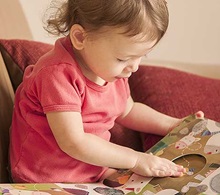 More and more, research tells us that our children’s healthy development depends on safe and positive experiences during the first few years of life. If you are a parent who works during these early years, choosing good childcare is one of the most important decisions you will ever make for your child.
More and more, research tells us that our children’s healthy development depends on safe and positive experiences during the first few years of life. If you are a parent who works during these early years, choosing good childcare is one of the most important decisions you will ever make for your child.
To help you make the right choice for childcare, Premier Academy has identified 13 research-based guidelines to think about when choosing a childcare program.
You might want to visit several different childcare, either centers or family childcare homes, before you decide which one is best for your family. Call each childcare program and schedule an appointment for your visit. Once you are there, stay for at least an hour to watch activities, check the surroundings, and ask questions. The checklist below provides a place for you to note which guidelines are met. Research shows that if a program follows guidelines, it is more likely to be a safe and healthy place for your child. Your state or county may have other guidelines to help ensure health and safety in child care programs.
Considering these guidelines can help you find a place where you feel comfortable leaving your child.
Supervision
- Are children supervised at all times, even when they are sleeping?
- How do the caregivers discipline children? (Hint: Discipline should be positive, clear, consistent, and fair.)
Handwashing and Diapering
- Do all caregivers and children wash their hands often, especially before eating and after using the bathroom or changing diapers?
- Is the place where diapers are changed clean?
- Do caregivers always keep a hand on the child while diapering?
- Do caregivers remove the soiled diaper without dirtying any surface not already in contact with stool or urine?
- Do caregivers clean and sanitize the surface after finishing the changing process? (Hands should be scrubbed with soap and warm running water for at least 20 seconds and then rinsed and dried. The water faucet should be turned off with a paper towel.)
Director Qualifications
- Does the director of a childcare center have a bachelor’s degree in a child-related field?
- Has the director worked in childcare for at least two years?
- Does the director understand what children need to grow and learn?
Lead Teacher Qualifications
- Does the lead teacher in a childcare center have a bachelor’s degree in a child-related field?
- Has the teacher worked in childcare for at least one year?
- Does the teacher give children lessons and toys that are right for their ages?
Child:Staff Ratio and Group Size
- How many children are being cared for in the childcare program?
- How many caregivers are there? (Your child will get more attention if each caregiver has fewer children to care for. The younger the children are, the more caregivers there should be. For example, one family home caregiver should only take care of two infants.)
Immunizations
- Is your child up-to-date on all of the required immunizations?
- Does the childcare program have records proving that the other children in care are up-to-date on all their required immunizations?
Toxic Substances
- Are toxic substances like cleaning supplies and pest killers kept away from children?
- Has the building been checked for dangerous substances like radon, lead and asbestos?
- Is poison control information posted?
Emergency Plan
- Does the childcare program have an emergency plan if a child is injured, sick, or lost?
- Does the childcare program have first-aid kits?
- Does the childcare program have information about who to contact in an emergency?
Fire/Emergency Drills
- Does the childcare program have a plan in case of a disaster like a fire, tornado, flood, blizzard, or earthquake?
- Does the childcare program do practice drills once every month?
Child Abuse
- Can caregivers be seen by others at all times, so a child is never alone with one caregiver?
- Have all caregivers undergone background check?
- Have the caregivers been trained on how to prevent child abuse, how to recognize signs of child abuse, and how to report suspected child abuse?
Medications
- Does the childcare program keep medication out of reach from children?
- Are the caregivers trained and the medications labeled to make sure the right child gets the right amount of the right medication at the right time?
Staff Training/First Aid
- Have caregivers been trained how to keep children healthy and safe from injury and illness?
- Do they know how to do first aid and rescue breathing?
- Have they been trained to understand and meet the needs of children of different ages?
- Are all childcare staff, volunteers, and substitutes trained on and implementing infant back sleeping and safe sleep policies to reduce the risk of SIDS (Sudden Infant Death Syndrome, crib death)? (When infants are sleeping, are they on their backs with no pillows, quilts, stuffed toys, or other soft bedding in the crib with them?)
Playgrounds
- Is the playground regularly inspected for safety?
- Is the playground surrounded by a fence?
- If there is a sandbox, is it clean?
- Are the soil and playground surfaces checked often for dangerous substances and hazards?
- Is equipment the right size and type for the age of children who use it?
Premier Academy offers affordable childcare in Omaha and Elkhorn, Nebraska. We invite you to tour our facilities and see what we can offer your child. Contact us today!

